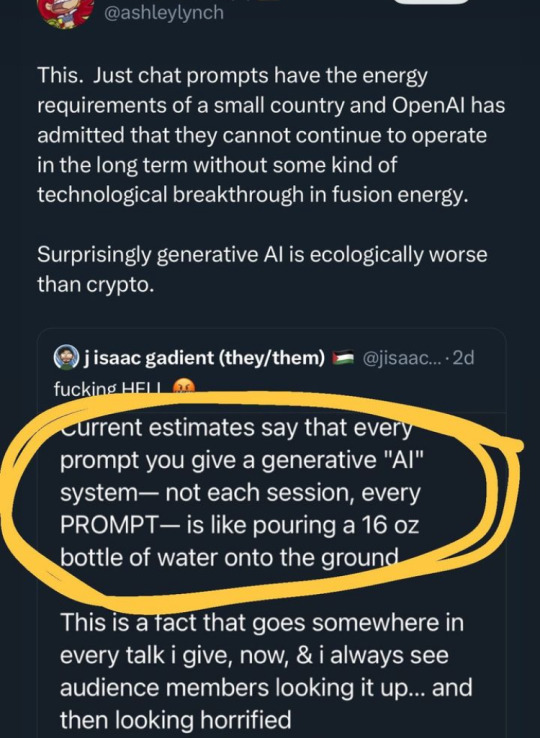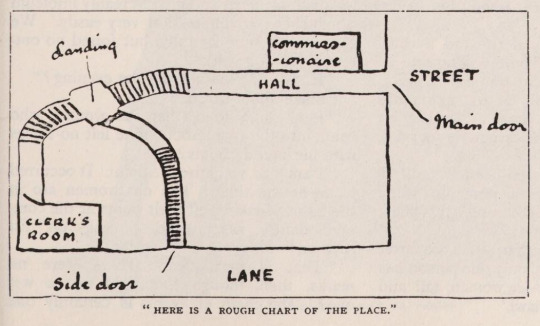#treatis
Text

#ai#ai art#climate change#ecology#ecocide#water rights#land back#respect water treaties with First Nations#wasteland#waste#waste fraud and abuse#desertification
62K notes
·
View notes
Text
source
On Friday, a group of protestors walked on Highway 89 in Cameron, Ariz., protesting Pinyon Plain Mine owner Energy Fuels trucking uranium ore through the Navajo Nation to Utah.
Uranium has a long history of impacts on the Navajo Nation and its people since the 1940s.
"We've seen the effects of these things in the past on our land, the spills into our rivers, into our communities, the residual effects on our on our health, of our children, our elders," Cameron resident Adair Klopfenstein said. "It's awful, and we don't want it to happen again."
The Pinyon Plain Mine, formerly known as Canyon Mine, began mining uranium ore in December and is expected to be actively mining for at least five years. The company had told 12News at the end of June it would start transporting the uranium ore to a mill in southeast Utah in July or August.
That hauling appears to have started before the pause was put in place.
"I call it illegal smuggling across our border and then through the Navajo Nation," Navajo Nation President Buu Nygren said.
And from June:
#Diné#Navajo#Navajo nation#news#human rights#u.s politics#american politics#current events#ndn#indigenous#Diné resistance#U.S Imperialism#Imperialism#solidarity#intersectional#systemic racism#treaty violation#call to action#indigenous ally#native ally#ally#allyship#kamala harris#joe biden#Harris 2024#genocide joe#vote
21K notes
·
View notes
Text
So for anyone who doesn’t keep up with nz politics, which i’m assuming is most of you, our new radical right government have decided one of their main aims of their term will be to re-interpret the Treaty of Waitangi.
The Treaty is an agreement between Maori and the Crown, now the NZ government. It is the founding document of new zealand and is recognised as a constitutional document today; it is the only treaty of its kind/time still honoured, and it is the steps we’ve taken through the Treaty to provide restitution and build an ongoing relationship with Maori and their iwi (tribes) that has allowed the relationship between Maori and the government to thrive where other indigenous groups have struggled to achieve recognition of their rights.
This is going to be entirely undone. Not only is this issue inflammatory and a threat to race relations in Aotearoa, leaked documents show the proposed “reinterpretation” wants to negate pretty much the entirety of the legal rights provided to Maori under the treaty. For example, the treaty article that guarantees land rights for Maori will be reinterpreted to guarantee land rights for “all New Zealanders”. Which means this article would be essentially meaningless for Maori.
By removing Maori from the context they are trying to put Maori on an “equal footing” with all New Zealanders; they are riding the idea that Maori have special rights and privileges above that of the average New Zealander. Obviously this is bullshit but it’s effective rhetoric and there’s a grain of truth to in that the extent of Maori rights hadn’t been clearly defined due to the ongoing nature of the process. So this has got a lot of people with a poor grasp of the issues very upset and baying for change.
There is a hui (meeting) being held today for all the iwi to begin discussions of how Maori will respond to this. New Zealand politics isn’t very interesting usually, but our progress on indigenous rights, until now, has been absolutely ahead of the field. If you care about indigenous rights globally, you should care about this, because in the same way Australia’s referendum loss has spurred on this action, the loss of rights here will spur other right wing governments to be similarly bold to their own indigenous groups.
Indigenous rights in New Zealand are under attack. They are meeting today to discuss it, and New Zealand will be listening, but I want the world to be listening. Because our government needs the shame of being called out by more than just the people who they’ve already decided don’t vote for them.
Maori have a long and proud history of fighting for their rights, and they’ll do it again here. And I’ll be on the pickets beside them, but there’ll be plenty of my own pickets to attend, because this government is radical in every sense of the word.
So please, even if you’re very far away, stand behind them in this. Keep your eyes on us. Amplify their voices. Don’t let the racism drown them out.
18K notes
·
View notes
Text
For thousands of years, Kettle Falls was a vital salmon fishing ground for the Sinixt, but early 20th-century dam construction blocked salmon migration.
Wrongfully declared extinct in Canada in 1956, the Sinixt fought for recognition and were officially acknowledged as Aboriginal Peoples of Canada in 2021.
In 2023, the U.S. government signed a $200 million agreement with a coalition of tribes, including the Sinixt, to fund an Indigenous-led salmon reintroduction program into the Columbia River system above dams in Washington.
Sinixt leaders say this project is an important effort to help right a historical wrong in the legacy that led to their “extinction” status, while many hope to one day join salmon efforts on their traditional territory in Canada.
#good news#environmentalism#sinixt#canada#usa#indigenous#indigenous peoples#indigenous activism#colonialism#science#environment#animals#fosh#salmon#rivers#indigenous rights#respect the treaties#aboriginal people
989 notes
·
View notes
Text
Holy CRAP the UN Cybercrime Treaty is a nightmare

Support me this summer on the Clarion Write-A-Thon and help raise money for the Clarion Science Fiction and Fantasy Writers' Workshop!

If there's one thing I learned from all my years as an NGO delegate to UN specialized agencies, it's that UN treaties are dangerous, liable to capture by unholy alliances of authoritarian states and rapacious global capitalists.
Most of my UN work was on copyright and "paracopyright," and my track record was 2:0; I helped kill a terrible treaty (the WIPO Broadcast Treaty) and helped pass a great one (the Marrakesh Treaty on the rights of people with disabilities to access copyrighted works):
https://www.wipo.int/treaties/en/ip/marrakesh/
It's been many years since I had to shave and stuff myself into a suit and tie and go to Geneva, and I don't miss it – and thankfully, I have colleagues who do that work, better than I ever did. Yesterday, I heard from one such EFF colleague, Katitza Rodriguez, about the Cybercrime Treaty, which is about to pass, and which is, to put it mildly, terrifying:
https://www.eff.org/deeplinks/2024/07/un-cybercrime-draft-convention-dangerously-expands-state-surveillance-powers
Look, cybercrime is a real thing, from pig butchering to ransomware, and there's real, global harms that can be attributed to it. Cybercrime is transnational, making it hard for cops in any one jurisdiction to handle it. So there's a reason to think about formal international standards for fighting cybercrime.
But that's not what's in the Cybercrime Treaty.
Here's a quick sketch of the significant defects in the Cybercrime Treaty.
The treaty has an extremely loose definition of cybercrime, and that looseness is deliberate. In authoritarian states like China and Russia (whose delegations are the driving force behind this treaty), "cybercrime" has come to mean "anything the government disfavors, if you do it with a computer." "Cybercrime" can mean online criticism of the government, or professions of religious belief, or material supporting LGBTQ rights.
Nations that sign up to the Cybercrime Treaty will be obliged to help other nations fight "cybercrime" – however those nations define it. They'll be required to provide surveillance data – for example, by forcing online services within their borders to cough up their users' private data, or even to pressure employees to install back-doors in their systems for ongoing monitoring.
These obligations to aid in surveillance are mandatory, but much of the Cybercrime Treaty is optional. What's optional? The human rights safeguards. Member states "should" or "may" create standards for legality, necessity, proportionality, non-discrimination, and legitimate purpose. But even if they do, the treaty can oblige them to assist in surveillance orders that originate with other states that decided not to create these standards.
When that happens, the citizens of the affected states may never find out about it. There are eight articles in the treaty that establish obligations for indefinite secrecy regarding surveillance undertaken on behalf of other signatories. That means that your government may be asked to spy on you and the people you love, they may order employees of tech companies to backdoor your account and devices, and that fact will remain secret forever. Forget challenging these sneak-and-peek orders in court – you won't even know about them:
https://www.eff.org/deeplinks/2024/06/un-cybercrime-draft-convention-blank-check-unchecked-surveillance-abuses
Now here's the kicker: while this treaty creates broad powers to fight things governments dislike, simply by branding them "cybercrime," it actually undermines the fight against cybercrime itself. Most cybercrime involves exploiting security defects in devices and services – think of ransomware attacks – and the Cybercrime Treaty endangers the security researchers who point out these defects, creating grave criminal liability for the people we rely on to warn us when the tech vendors we rely upon have put us at risk.
This is the granddaddy of tech free speech fights. Since the paper tape days, researchers who discovered defects in critical systems have been intimidated, threatened, sued and even imprisoned for blowing the whistle. Tech giants insist that they should have a veto over who can publish true facts about the defects in their products, and dress up this demand as concern over security. "If you tell bad guys about the mistakes we made, they will exploit those bugs and harm our users. You should tell us about those bugs, sure, but only we can decide when it's the right time for our users and customers to find out about them."
When it comes to warnings about the defects in their own products, corporations have an irreconcilable conflict of interest. Time and again, we've seen corporations rationalize their way into suppressing or ignoring bug reports. Sometimes, they simply delay the warning until they've concluded a merger or secured a board vote on executive compensation.
Sometimes, they decide that a bug is really a feature – like when Facebook decided not to do anything about the fact that anyone could enumerate the full membership of any Facebook group (including, for example, members of a support group for people with cancer). This group enumeration bug was actually a part of the company's advertising targeting system, so they decided to let it stand, rather than re-engineer their surveillance advertising business.
The idea that users are safer when bugs are kept secret is called "security through obscurity" and no one believes in it – except corporate executives. As Bruce Schneier says, "Anyone can design a system that is so secure that they themselves can't break it. That doesn't mean it's secure – it just means that it's secure against people stupider than the system's designer":
The history of massive, brutal cybersecurity breaches is an unbroken string of heartbreakingly naive confidence in security through obscurity:
https://pluralistic.net/2023/02/05/battery-vampire/#drained
But despite this, the idea that some bugs should be kept secret and allowed to fester has powerful champions: a public-private partnership of corporate execs, government spy agencies and cyber-arms dealers. Agencies like the NSA and CIA have huge teams toiling away to discover defects in widely used products. These defects put the populations of their home countries in grave danger, but rather than reporting them, the spy agencies hoard these defects.
The spy agencies have an official doctrine defending this reckless practice: they call it "NOBUS," which stands for "No One But Us." As in: "No one but us is smart enough to find these bugs, so we can keep them secret and use them attack our adversaries, without worrying about those adversaries using them to attack the people we are sworn to protect."
NOBUS is empirically wrong. In the 2010s, we saw a string of leaked NSA and CIA cyberweapons. One of these, "Eternalblue" was incorporated into off-the-shelf ransomware, leading to the ransomware epidemic that rages even today. You can thank the NSA's decision to hoard – rather than disclose and patch – the Eternalblue exploit for the ransoming of cities like Baltimore, hospitals up and down the country, and an oil pipeline:
https://en.wikipedia.org/wiki/EternalBlue
The leak of these cyberweapons didn't just provide raw material for the world's cybercriminals, it also provided data for researchers. A study of CIA and NSA NOBUS defects found that there was a one-in-five chance of a bug that had been hoarded by a spy agency being independently discovered by a criminal, weaponized, and released into the wild.
Not every government has the wherewithal to staff its own defect-mining operation, but that's where the private sector steps in. Cyber-arms dealers like the NSO Group find or buy security defects in widely used products and services and turn them into products – military-grade cyberweapons that are used to attack human rights groups, opposition figures, and journalists:
https://pluralistic.net/2021/10/24/breaking-the-news/#kingdom
A good Cybercrime Treaty would recognize the perverse incentives that create the coalition to keep us from knowing which products we can trust and which ones we should avoid. It would shut down companies like the NSO Group, ban spy agencies from hoarding defects, and establish an absolute defense for security researchers who reveal true facts about defects.
Instead, the Cybercrime Treaty creates new obligations on signatories to help other countries' cops and courts silence and punish security researchers who make these true disclosures, ensuring that spies and criminals will know which products aren't safe to use, but we won't (until it's too late):
https://www.eff.org/deeplinks/2024/06/if-not-amended-states-must-reject-flawed-draft-un-cybercrime-convention
A Cybercrime Treaty is a good idea, and even this Cybercrime Treaty could be salvaged. The member-states have it in their power to accept proposed revisions that would protect human rights and security researchers, narrow the definition of "cybercrime," and mandate transparency. They could establish member states' powers to refuse illegitimate requests from other countries:
https://www.eff.org/press/releases/media-briefing-eff-partners-warn-un-member-states-are-poised-approve-dangerou

If you'd like an essay-formatted version of this post to read or share, here's a link to it on pluralistic.net, my surveillance-free, ad-free, tracker-free blog:
https://pluralistic.net/2024/07/23/expanded-spying-powers/#in-russia-crime-cybers-you

Image:
EFF
https://www.eff.org/files/banner_library/cybercrime-2024-2b.jpg
CC BY 3.0
https://creativecommons.org/licenses/by/3.0/us/
837 notes
·
View notes
Text


sometimes I think abt how the months coming up to and the prom night in freshman year must feel to class swap sklonda. your perfect kid who has literally never gotten a single reprimand for anything does what can only be described as a quad crit crime combo and becomes a nerd punisher by the end of the night

#dimension 20#fantasy high#fhfy#fhjy#riz gukgak#ft. sklonda fig and jawbones#fh class quangle#class swap! bard!riz u know the drill!#the peace treaty thing is about kalina being employed by the fallinel government. I imagine riz can tease out Too Much from that#this is my favourite thing. when a character becomes annoying to show that they feel comfortable around certain people#one thing I will never change about riz is that he goes whole hog all the time forever. kid does Not know moderation he is 100% at all time#the switch up in freshman year turns out slow bc he and his friends get thrown in jail for two months but the moment he#gets the memo that he just doesn't get to bow out of the fight like other people bc of who he is he immediately goes okay <3 violence it is#I feel like I've been kinda glossing over how Intense the little guy is in the class swap bc it's a more lowkey kind of intense usually#but like he is lol. he's intense and he's Mean too. that's his magic <3
758 notes
·
View notes
Text

Been rereading Ranger’s Apprentice this summer, so here’s Halt and his baby boys
#my art#rangers apprentice#halt o'carrick#will treaty#gilan davidson#just started royal ranger so i needed to draw will when he was happy
552 notes
·
View notes
Text




2K notes
·
View notes
Text
"WOA, that sounds very good. what song is this?"
"oh ! it's blackboxwarrior - okultra. it's by my favorite music artist, his name is -

#will wood#not the daily words#we are learning about the treaty of versailles in history and thought i should make this post
456 notes
·
View notes
Text
https://ictnews.org/news/us-promises-240m-to-improve-fish-hatcheries-protect-tribal-rights

The U.S. government will invest $240 million in salmon and steelhead hatcheries in the Pacific Northwest to boost declining fish populations and support the treaty-protected fishing rights of Native American tribes, officials announced Thursday.
The departments of Commerce and the Interior said there will be an initial $54 million for hatchery maintenance and modernization made available to 27 tribes in the region, which includes Oregon, Washington, Idaho and Alaska.
#indigenous#native american#tribal rights#respect water treaties with first nations#honor the treaties#usa#usa news#usa pol#us news#good news#nature#environmentalism#environment#science#animals#fish#fisheries
398 notes
·
View notes
Note
hi honey!! how about cat + gem for the hermit swap ask gam? <3 love from tuna

u want kitty gem? meow meow meow meow? =^. .^=

#tiny version carry her around in your pocket . feed her freeze dried fish treaties#dans ma vie#briseiseart#asks#ask game#archer-io#HI TUNNAAAAAA BABY CAT FOR U#geminitay#hermitcraft fanart#fanon swap
990 notes
·
View notes
Text
Have you heard of the American Indian Movement? Did you know natives had a movement/group in the 70's-80's dedicated to native liberation?
No? It's a part of history they don't teach you in school, but come close and look so I can show you.
Watch this, it's not long I promise. This is Russel Means, a prominent native activists and one of the leaders of AIM. AIM sought to help natives with things like tribal sovereignty, housing, healthcare, and food security.
Here he is testifying to the US government.
youtube
The transcript ^
A little excerpt of the end:
"The American Indian people’s right to self-determination is recognized and will be implemented through the following policies:
The American Indian individual shall have the right to choose his or her citizenship and the American Indian nations have the right to choose their level of citizenship and autonomy up to absolute independence;
The American Indian will have their just property rights restored which include rights of easement, access, hunting, fishing, prayer, and water;
The BIA will be abolished with the American Indian tribal members deciding the extent and nature of their governments, if any;
Negotiations will be undertaken to exchange otherwise unclaimed and un-owned federal property for any and all government obligations to the American Indian nations, and to fully -- and to hold fully liable those responsible for any and all damages which have resulted from the resource development on or near our reservation lands including the -- including damages done by careless and inexcusable disposal of uranium mill tailings and other mineral and toxic wastes.
I want to thank you, gentlemen, for inviting me here. It's been a high honor, especially since I'm the only one invited here today to testify that doesn't receive money from the federal government. Also, I want to make -- I was introduced as a former founder and leader of American Indian movement to the tribal chairwoman that you have here, a former associates for the American Indian Movement back in the days when we were gross militants and so I just wanted to let you in on that, that the American Indian Movement is a very proud continuing part of American Indian Society.
Thank you."




"The American Indian Movement remains based in Minneapolis with several branches nationwide. The organization prides itself on fighting for the rights of Native peoples outlined in treaties and helping to preserve indigenous traditions and spiritual practices. The organization also has fought for the interests of aboriginal peoples in Canada, Latin America and worldwide. “At the heart of AIM is deep spirituality and a belief in the connectedness of all Indian people,” the group states on its website."
#AIM#American indian movement#usa#politics#native sovereignty#tribal sovereignty#native rights#treaty rights#human rights#russel means#dennis banks#leonard peltier#native america#native#indigenous#ndn#BIA#bureau of indian affairs#colonialism#settler#settler colonialism#usamerican#liberals#progressives#leftist#ogala lakota#native pride#american history#native history#lakota history
1K notes
·
View notes
Text
The King's Informants
Many would say that the Infinite Realms were at peace, now that the ghosts weren't constantly attacking Amity. And in a way they were, but still had some problems.
The Infinite Realms were chaotic and usually didn't follow any rules, Danny's reign didn't change that. That was because death had its own rules and the Realms did their job, Pariah was just horrible at being a ruler and also horrible at making sure everything was more or less where it should be.
When the Ancients recorded a lost soul (which was more common than it seemed), which was neither a ghost nor had passed "to the afterlife" directly, Danny tended to ask the citizens of Amity Park for help, who were grateful with him for his ex job as hero and used to help him. Even if they weren't living in Amity.
Danny would sometimes communicate with them in their sleep, with some help from Nocturne, and explain what they needed to investigate (Danny felt they were some kind of secret informants, or spies, if he was being honest.)
This time, the Realms were in turmoil as "Jason Todd's" soul was missing (and no, Danny wasn't pouting about losing his friend), his soul hadn't registered in any other death cycles or Resurrection. So the King asked Dash to investigate about it and Dash, now a Policeman from Gotham, taked his job seriously.
The "no one is forgotten" network was made up of Amity citizens willing to investigate missing soul anomalies in other cities. This was mostly the Justice League's fault or to do with them, which was pretty frustrating.
Danny was wondering if he should pay them a visit when he was informed that the missing soul was in the realm of the living. The halfa sighed tiredly, he wasn't going to kill Jason to repair the "cycle of life and death" (because that would be hypocritical) but he had to solve the problems caused by said alteration. Being King was fucking tiring.
#dpxdc#Amity Parkers are informants#they investigate the anomalies and tell Danny about them#Danny and the council discuss how to solve them#Amity Parkers use Fenton gadgets#To defend themselves#Amity Park love Phantom#dp x dc#dc x dp#ghost king danny#he's tired#and mad with the Justice League#but not with Jason#he probably needs to talk with Jason#He was his friend before his disappearance#Technically Amity Park is part of Infinite Realms secret society#they have a peace treaty#Danny still thinks they are more like spies than informants#but it's okay since they are helping him
2K notes
·
View notes
Text

Find the Ranger(s) LOL
#rangers apprentice#ranger's apprentice#john flanagan#crack post#will treaty#halt o'carrick#gilan davidson#crowley meratyn
508 notes
·
View notes
Text

If y’all remember flat Will Treaty, i finally decided to give him the third dimension.
Also i forgot oakleaf but lets say sometimes rangers keep it hidden
(flat and flatter Treaty under the readmore)


#also ignore the anatomy i promise ill start practicing it#will treaty#rangers apprentice#ranger's apprentice#baby will treaty#i am sorry howls#next time it will be dilf rugged meow meow will treaty#thursday art
774 notes
·
View notes
Text
i prefer happy ending bbc merlin where morgana becomes court sorceress and arthur becomes king and merlin remains as his servant (until they eventually marry) and lancelot lives and he and gwen marry but that damn game of thrones (?? probably idk) audio on tiktok that goes “i mean to fight this war and win it.” “good. to war then.” keeps giving me visions of king arthur of camelot on the verge of war with other kingdoms and his powerful court sorcerer merlin standing by his throne. arthur declares that he wishes to go to war and merlin (eager to bring about the united albion the prophecies speak of) supports arthur immediately and declares they’re going to war
#their plan isn't to conquer and beat the other kingdoms into submission#but some kingdoms like essetir and deorham will not go willingly so war will be waged there#but mostly the plan is to make the current kings and queens sorts of lords and ladies#like nemeth and gawant#mithian and elena can keep their power over their kingdoms but they must sign a treaty of sorts#one that outlines that they recognize arthur as the high king and that his word is law#they can make rulings and laws but if arthur disagrees then he can do away with their decision#sort of like federal vs local goverment#bbc merlin#merlin emrys#arthur pendragon#merthur
181 notes
·
View notes